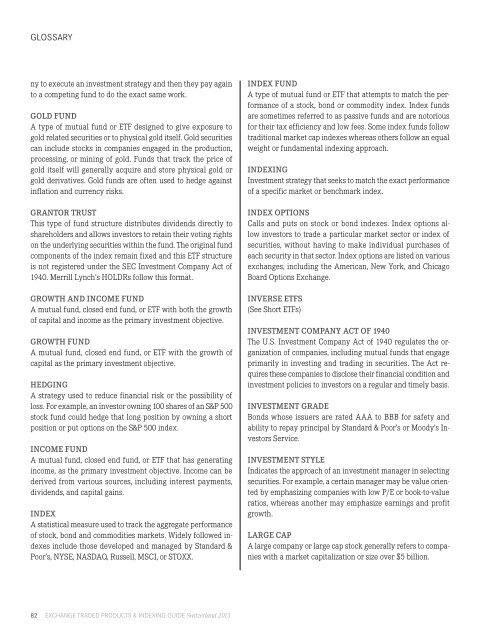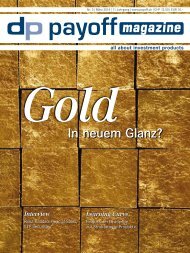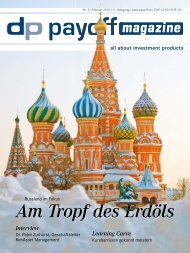You also want an ePaper? Increase the reach of your titles
YUMPU automatically turns print PDFs into web optimized ePapers that Google loves.
glossarY<br />
ny to execute an investment strategy and then they pay again<br />
to a competing fund to do the exact same work.<br />
GOLD FUND<br />
A type of mutual fund or ETF designed to give exposure to<br />
gold related securities or to physical gold itself. Gold securities<br />
can include stocks in companies engaged in the production,<br />
processing, or mining of gold. Funds that track the price of<br />
gold itself will generally acquire and store physical gold or<br />
gold derivatives. Gold funds are often used to hedge against<br />
inflation and currency risks.<br />
GRANTOR TRUST<br />
This type of fund structure distributes dividends directly to<br />
shareholders and allows investors to retain their voting rights<br />
on the underlying securities within the fund. The original fund<br />
components of the index remain fixed and this ETF structure<br />
is not registered under the SEC Investment Company Act of<br />
1940. Merrill Lynch’s HOLDRs follow this format.<br />
GROWTH AND INCOME FUND<br />
A mutual fund, closed end fund, or ETF with both the growth<br />
of capital and income as the primary investment objective.<br />
GROWTH FUND<br />
A mutual fund, closed end fund, or ETF with the growth of<br />
capital as the primary investment objective.<br />
HEDGING<br />
A strategy used to reduce financial risk or the possibility of<br />
loss. For example, an investor owning 100 shares of an S&P 500<br />
stock fund could hedge that long position by owning a short<br />
position or put options on the S&P 500 index.<br />
INCOME FUND<br />
A mutual fund, closed end fund, or ETF that has generating<br />
income, as the primary investment objective. Income can be<br />
derived from various sources, including interest payments,<br />
dividends, and capital gains.<br />
INDEX<br />
A statistical measure used to track the aggregate performance<br />
of stock, bond and commodities markets. Widely followed indexes<br />
include those developed and managed by Standard &<br />
Poor’s, NYSE, NASDAQ, Russell, MSCI, or STOXX.<br />
82 ExchangE TradEd ProducTs & IndExIng guIdE <strong>Switzerland</strong> <strong>2013</strong><br />
INDEX FUND<br />
A type of mutual fund or ETF that attempts to match the performance<br />
of a stock, bond or commodity index. Index funds<br />
are sometimes referred to as passive funds and are notorious<br />
for their tax efficiency and low fees. Some index funds follow<br />
traditional market cap indexes whereas others follow an equal<br />
weight or fundamental indexing approach.<br />
INDEXING<br />
Investment strategy that seeks to match the exact performance<br />
of a specific market or benchmark index.<br />
INDEX OPTIONS<br />
Calls and puts on stock or bond indexes. Index options allow<br />
investors to trade a particular market sector or index of<br />
securities, without having to make individual purchases of<br />
each security in that sector. Index options are listed on various<br />
exchanges, including the American, New York, and Chicago<br />
Board Options <strong>Exchange</strong>.<br />
INVERSE ETFS<br />
(See Short ETFs)<br />
INVESTMENT COMPANY ACT OF 1940<br />
The U.S. Investment Company Act of 1940 regulates the organization<br />
of companies, including mutual funds that engage<br />
primarily in investing and trading in securities. The Act requires<br />
these companies to disclose their financial condition and<br />
investment policies to investors on a regular and timely basis.<br />
INVESTMENT GRADE<br />
Bonds whose issuers are rated AAA to BBB for safety and<br />
ability to repay principal by Standard & Poor’s or Moody’s Investors<br />
Service.<br />
INVESTMENT STYLE<br />
Indicates the approach of an investment manager in selecting<br />
securities. For example, a certain manager may be value oriented<br />
by emphasizing companies with low P/E or book-to-value<br />
ratios, whereas another may emphasize earnings and profit<br />
growth.<br />
LARGE CAP<br />
A large company or large cap stock generally refers to companies<br />
with a market capitalization or size over $5 billion.

















